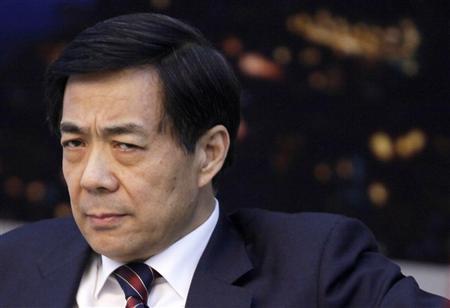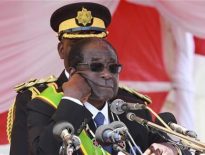By Don Durfee and Chris Buckley
BEIJING (Reuters) – China’s
most lurid political scandal in years could claim yet another victim – the boldness to grasp difficult reforms needed to ward
off mounting risks to growth and stability.

Beijing long ago signalled the need for deeper changes to usher in the next round of
growth as the country’s polluting, export-led model runs out of steam.
But in recent months, Premier Wen Jiabao and
others have warned that China is running out of time to tackle important reforms, including freeing up land ownership and
reining in the coddled state-owned sector.
The ouster of ambitious leadership contender Bo Xilai, who wrapped himself
in populist rhetoric, could sap China’s will to tackle nettlesome problems by discouraging bold ideas from either to the
left or the right, especially ahead of a leadership succession from later this year.
Bo was a brash politician who
loved the limelight, a rival who needled other leaders to compete in policy innovations, said analysts.
“When Bo Xilai
was still a factor, that was provoking rivalry between left and right, and encouraging more reformist impulses so that each
camp could show its stance,” said Chen Yongmiao, a lawyer and political commentator in Beijing.
Had Bo had been
promoted to the top leadership, “reformists might have had to be more forceful precisely in order to counter his influence”,
said Chen. “But now he’s been ousted, their steps could be weaker because the incentive isn’t there.”
This week, the
ruling Chinese Communist Party announced Bo, recently dismissed as the party chief of Chongqing municipality in southwest
China, had also been suspended from the Central Committee, a council of senior officials. Bo’s wife was named as a suspect
in the murder of British businessman Neil Heywood.
Until his abrupt downfall, Bo was widely seen as a contender for a
spot in the party’s next Standing Committee, an inner-circle of decision-making power that now has nine members.
Even
before the stunning announcement about Bo, President Hu Jintao had signalled caution in the face of calls to embrace big
financial and political reforms that would curtail central power, according to an editor in Beijing with close ties to senior
officials.
“Now is not the right time to consider reform in some crucial areas,” Hu said recently, according to the
editor, who spoke on condition of anonymity, citing the sensitivity of policy debates.
Hu did not specify which
reforms he meant, but the editor took it to mean that political changes, along with challenges to the grip of the powerful
state-owned businesses, were off limits.
Just last week Premier Wen called the country’s big banks a monopoly that
must be dismantled to get money flowing to cash-starved private firms.
Other changes include reforming land ownership,
which could dramatically increase the supply of housing and let out air from the property bubble, opening state-dominated
sectors like telecommunications and healthcare to real private competition, and introducing market-based interest rates for
banks.
Further delay in such reforms is an alarming prospect for economists who see trouble ahead if some of the most
important changes are put off for much longer.
An increasingly urgent chorus of policy-advisers and intellectuals
warns that without reforms, economic growth and political stability could be imperilled.
“You can wait until after the
leadership transition (in early 2013) but by then you might already have a crisis,” said Tao Ran, a professor of economics at
Renmin University in Beijing.
THE CASE FOR CHANGE
Pushing through big change in a year of leadership transition
was always going to be difficult. Breaking up state monopolies and fiscal reforms could create disruption the party wants to
avoid as it tries to engineer a smooth handover of power.
But the leadership rifts uncovered by the Bo Xilai scandal
suggest that even after the new leaders take power, it could be hard to achieve the consensus needed to confront vested
interests like state-owned enterprises and banks.
“Reform needs an ideological consensus or overriding will from a
powerful leader like Deng Xiaoping, and that doesn’t exist,” said the Beijing editor.
“The system of power prizes
stability before all else, and there’s no real reform that doesn’t affect stability, so there’s no real will to take on
deeper reforms.”
China’s past decades of stunning growth have been driven by huge overinvestment in manufacturing,
which has produced a glut in production capacity. To ensure a market for all those goods, China has held its currency low,
which in turn has brought back a flood of foreign exchange that has stoked inflation and real estate bubbles, among
others.
Along the way, a growing state sector has stifled innovation and encouraged misallocation of capital, often
funnelling it into even more industrial capacity in China’s coastal areas.
Shrinking the bubbles and spreading wealth
more evenly means spurring domestic consumption and fostering more private sector competition, both of which could boost
growth and create jobs, which are priorities for the Communist Party.
“There is still huge room for China to grow if
it deregulates land, for instance,” said Tao of Renmin University. “With 200 million migrant workers and their families,
there are maybe 150 million housing units that need to be built. That’s a huge business.”
Some reforms are edging
ahead.
Last week, Premier Wen announced plans for a pilot project in Wenzhou to encourage small lenders to help
private businesses often ignored by the state-owned banks.
And in recent years, the government has expanded the
offshore market for trading the yuan, a major step for eventual liberalisation of the currency.
But critics say such
changes are no substitute for bigger reforms that keep getting pushed back.
“These are issues you can postpone by a
few months or year or longer, and that is what has been happening for a long time,” said Louis Kuijs, a former World Bank
economist now with the Fung Global Institute in Hong Kong.
“But if the measures the government will use to rebalance
its economy don’t include hard-to-take reforms like levelling the playing field for private enterprise, then you may see
that growth comes down a lot.”
While few expect glimmers of major change before the leadership handover, there is the
chance that the departure of Bo, with his brash ways and Mao Zedong-inspired rhetoric, could actually make it easier the new
leaders to muster consensus for reform.
“It will help reform by removing this advocate of policies inspired by Mao,”
said Wu Jiaxiang, a former central government official in Beijing who writes about politics.
(Additional reporting by
Kevin Yao; Editing by Brian Rhoads and Robert Birsel)





